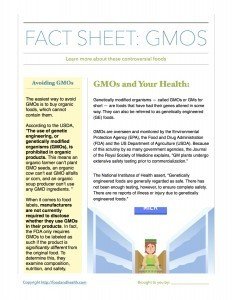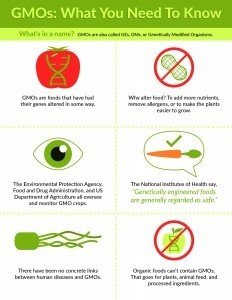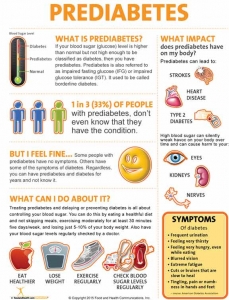GMOs: A Health Distractor?
Do your clients ever ask you about GMOs? This hot-button issue has been dominating the media lately, and after chatting with one of our readers, I thought it was high time to make a handout that featured the facts.You see, a few weeks ago, Pat Hunter came to me with a concern, writing,
I am planning a few programs on [GMOs] for September and I was wondering if you have developed any materials on the topic. I find most consumers are confused on the topic. I searched the site and did not see any handouts.
No handouts?! Well, that had to change!Pat and I corresponded, discussing the impact of GMOs on the current discussions of nutrition and health, and he concluded,
I find so many customers/consumers have no real knowledge of what it all means and from my standpoint, it's a popular topic to pull in customers for a tour. In April I was fortunate enough to attend Produce for Better Health annual meeting and one of the researchers spoke on the topic. They refer to the topic as one example of a health distractor that keeps consumers from the real issues. It is so very true - scare tactics! Our focus needs to be on quality of the diet and reducing processed foods and eating more fruits, veggies, whole foods, and to look at the quantity of overall foods.
Are GMOs a health distractor, pulling the conversation from healthful habits and towards scare tactics? Let's find out!What Are GMOs? Genetically modified organisms -- called GMOs or GMs for short -- are foods that have had their genes altered in some way. They can also be referred to as genetically engineered (GE) foods.Genetic alterations can be performed in order to change the features of a food, removing allergens or helping the plant resist drought or disease. According to the Washington State Department of Health, "The most common engineered crops are soybean, corn, canola and cotton oil." Medline Plus maintains, "Tomatoes, potatoes, squash, corn, and soybeans have been genetically altered through biotechnology. Many more foods contain engineered ingredients and more are being developed."What Are The Effects of GMOs on Health?The National Institutes of Health assert, "Genetically engineered foods are generally regarded as safe. There has not been enough testing, however, to ensure complete safety. There are no reports of illness or injury due to genetically engineered foods."GMOs are overseen and monitored by the Environmental Protection Agency (EPA), the Food and Drug Administration (FDA) and the US Department of Agriculture (USDA). Because of this scrutiny by so many government agencies, "GM plants undergo extensive safety testing prior to commercialization" (source).
Genetically modified organisms -- called GMOs or GMs for short -- are foods that have had their genes altered in some way. They can also be referred to as genetically engineered (GE) foods.Genetic alterations can be performed in order to change the features of a food, removing allergens or helping the plant resist drought or disease. According to the Washington State Department of Health, "The most common engineered crops are soybean, corn, canola and cotton oil." Medline Plus maintains, "Tomatoes, potatoes, squash, corn, and soybeans have been genetically altered through biotechnology. Many more foods contain engineered ingredients and more are being developed."What Are The Effects of GMOs on Health?The National Institutes of Health assert, "Genetically engineered foods are generally regarded as safe. There has not been enough testing, however, to ensure complete safety. There are no reports of illness or injury due to genetically engineered foods."GMOs are overseen and monitored by the Environmental Protection Agency (EPA), the Food and Drug Administration (FDA) and the US Department of Agriculture (USDA). Because of this scrutiny by so many government agencies, "GM plants undergo extensive safety testing prior to commercialization" (source). The study, Genetically modified plants and human health by Suzie Key, Julian K-C Ma, and Pascal MW Drake, reveals that "There is little documented evidence that GM crops are potentially toxic." Another study, Public health issues related with the consumption of food obtained from genetically modified organisms by A Paparini and V Romano-Spica makes similar assertions, maintaining "Despite no described medical condition being directly associated with a diet including approved GM crops in large exposed populations such as 300,000,000 Americans and a billion Chinese, public opinion seems to look at this new technology with either growing concern or even disapproval." That sentiment is echoed in a GMO FAQ sheet, which claims, "GMOs have been a part of the American diet since the mid-1990s. There are no links to specific health problems (Key, Ma, & Drake, 2008). However, some people worry that eating GMOs could be bad for your health." This sheet takes the thought further, revealing that "Most studies say that eating GMOs pose no increased health risk. Other studies recommend more testing in order to be sure."We're all in favor of more testing -- further analysis may shed additional light on whether GMOs are safe for human consumption. However, do GMOs merit this much concern and discussion when a large body of evidence indicates that they are not the root causes of health issues?How Can I Find GMOs? How Can I Avoid Them?
The study, Genetically modified plants and human health by Suzie Key, Julian K-C Ma, and Pascal MW Drake, reveals that "There is little documented evidence that GM crops are potentially toxic." Another study, Public health issues related with the consumption of food obtained from genetically modified organisms by A Paparini and V Romano-Spica makes similar assertions, maintaining "Despite no described medical condition being directly associated with a diet including approved GM crops in large exposed populations such as 300,000,000 Americans and a billion Chinese, public opinion seems to look at this new technology with either growing concern or even disapproval." That sentiment is echoed in a GMO FAQ sheet, which claims, "GMOs have been a part of the American diet since the mid-1990s. There are no links to specific health problems (Key, Ma, & Drake, 2008). However, some people worry that eating GMOs could be bad for your health." This sheet takes the thought further, revealing that "Most studies say that eating GMOs pose no increased health risk. Other studies recommend more testing in order to be sure."We're all in favor of more testing -- further analysis may shed additional light on whether GMOs are safe for human consumption. However, do GMOs merit this much concern and discussion when a large body of evidence indicates that they are not the root causes of health issues?How Can I Find GMOs? How Can I Avoid Them? The easiest way to avoid GMOs is to buy organic foods, which cannot contain them.According to a blog post from the USDA, "The use of genetic engineering, or genetically modified organisms (GMOs), is prohibited in organic products. This means an organic farmer can’t plant GMO seeds, an organic cow can’t eat GMO alfalfa or corn, and an organic soup producer can’t use any GMO ingredients. To meet the USDA organic regulations, farmers and processors must show they aren’t using GMOs and that they are protecting their products from contact with prohibited substances, such as GMOs, from farm to table."When it comes to food labels, as of the date of this article's publication, manufacturers are not required to disclose whether they use GMOs in their products. In fact, "The FDA requires labeling of GMOs only if the product is significantly different from the original food in nutrition, safety, and composition" (source). Manufacturers can voluntarily label their products, but it appears as though that process is not currently tightly regulated.Should I Worry about GMOs?
The easiest way to avoid GMOs is to buy organic foods, which cannot contain them.According to a blog post from the USDA, "The use of genetic engineering, or genetically modified organisms (GMOs), is prohibited in organic products. This means an organic farmer can’t plant GMO seeds, an organic cow can’t eat GMO alfalfa or corn, and an organic soup producer can’t use any GMO ingredients. To meet the USDA organic regulations, farmers and processors must show they aren’t using GMOs and that they are protecting their products from contact with prohibited substances, such as GMOs, from farm to table."When it comes to food labels, as of the date of this article's publication, manufacturers are not required to disclose whether they use GMOs in their products. In fact, "The FDA requires labeling of GMOs only if the product is significantly different from the original food in nutrition, safety, and composition" (source). Manufacturers can voluntarily label their products, but it appears as though that process is not currently tightly regulated.Should I Worry about GMOs? After all the research I did, I found that I personally don't see anything wrong with GMOs. Instead, I believe that rather than making sure their foods are GMO-free, most people just have to stop eating so much processed food, replacing those items with fruits, vegetables, and other whole foods. After all, who can argue about GMOs while eating a steady diet of fatty burgers and packaged cookies?It's time to change the conversation from "GMOs-as-the-most-dangerous-foods" and instead discuss the elements that have been much more closely linked to chronic disease -- added sugars, saturated fats, excess sodium, etc. There's a lot more science to back that up.I've put together a free GMO handout that features the highlights of what we discovered in our research. Get your copy today and let me know what you think!
After all the research I did, I found that I personally don't see anything wrong with GMOs. Instead, I believe that rather than making sure their foods are GMO-free, most people just have to stop eating so much processed food, replacing those items with fruits, vegetables, and other whole foods. After all, who can argue about GMOs while eating a steady diet of fatty burgers and packaged cookies?It's time to change the conversation from "GMOs-as-the-most-dangerous-foods" and instead discuss the elements that have been much more closely linked to chronic disease -- added sugars, saturated fats, excess sodium, etc. There's a lot more science to back that up.I've put together a free GMO handout that features the highlights of what we discovered in our research. Get your copy today and let me know what you think! Are you a Food and Health Communications member? If so, today is your lucky day, because you can also access a brand-new GMO infographic! Pop over to the post, GMO Infographic to get your very own copy.
Are you a Food and Health Communications member? If so, today is your lucky day, because you can also access a brand-new GMO infographic! Pop over to the post, GMO Infographic to get your very own copy. Remember, we're here to help you look your very best, right now! Which of these research-based materials will you add to your repertoire?
Remember, we're here to help you look your very best, right now! Which of these research-based materials will you add to your repertoire?




